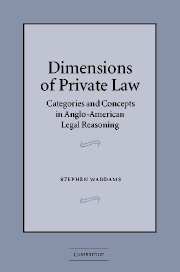Book contents
- Frontmatter
- Contents
- Preface
- Table of cases
- 1 Introduction: the mapping of legal concepts
- 2 Johanna Wagner and the rival opera houses
- 3 Liability for economic harms
- 4 Reliance
- 5 Liability for physical harms
- 6 Profits derived from wrongs
- 7 Domestic obligations
- 8 Interrelation of obligations
- 9 Property and obligation
- 10 Public interest and private right
- 11 Conclusion: the concept of legal mapping
- Works cited
- Index
10 - Public interest and private right
Published online by Cambridge University Press: 15 July 2009
- Frontmatter
- Contents
- Preface
- Table of cases
- 1 Introduction: the mapping of legal concepts
- 2 Johanna Wagner and the rival opera houses
- 3 Liability for economic harms
- 4 Reliance
- 5 Liability for physical harms
- 6 Profits derived from wrongs
- 7 Domestic obligations
- 8 Interrelation of obligations
- 9 Property and obligation
- 10 Public interest and private right
- 11 Conclusion: the concept of legal mapping
- Works cited
- Index
Summary
Many shades of opinion are to be found among judges and academics on the question of the relation between private law and public policy. Three main strands may be discerned. First is the view that the two are separate; legal rules are to be derived or deduced from legal sources, the function of private law being not the creation of law in the public interest, but the declaration and application of pre-existing law for the prevention and correction of injustice between the individual parties to each dispute. Second, there is the view that when courts are called upon to create a new rule, or to modify an old one, or to extend it to a new situation, they address the question of whether the proposed rule would be, on balance, beneficial to the community; assessment of this question requires the weighing of the costs and benefits of the proposed rule as it will be applied in the future to parties other than the individual litigants in the current case. Third is the view that an element of judgment is frequently involved that includes broad social and political considerations. There are many intervening combinations and shades of opinion.
The three main views correspond broadly with what may, for the sake of convenience, be epitomized as principle, utility, and policy. These have sometimes been presented as competing ‘theories’, of which the reader is impliedly invited to choose one and reject the other two.
- Type
- Chapter
- Information
- Dimensions of Private LawCategories and Concepts in Anglo-American Legal Reasoning, pp. 191 - 221Publisher: Cambridge University PressPrint publication year: 2003
- 1
- Cited by



